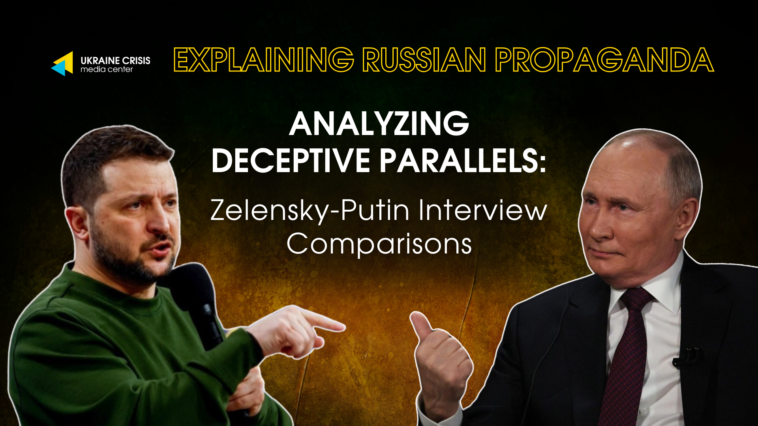Written by Matt Wickham, analyst UCMC/HWAG
As the hype surrounding the Carlson interview orchestrated by the Kremlin’s propagandists gradually subsides, along with the relentless efforts to magnify its significance beyond reality, Russian propaganda has pivoted to a new strategy: comparing Zelensky’s recent interview with Fox News to those of Carlson and Putin. The Kremlin has sought to frame Zelensky’s interview as a direct response to Putin’s, attempting to draw false parallels between the two. Zelensky’s interview sees ~160 thousand views on YouTube, with the full interview not even published on social media. Whereas Putin’s interview, hosted on Carlson’s own YouTube channel, amassed over 18 million views and millions on X, thanks to the frenzied resharing by Russian propagandists and their foreign mouthpieces. This contrast, however, underscores the fallacy of equating the two interviews.
Here, in this article, we briefly dismantle the notion that the people are ‘bored’ of Zelensky and that there is more to an interview than just a view ‘count’, regardless of what the Kremlin’s propaganda army wants you to believe. Therefore, exposing this narrative as nothing more than another facet of the Kremlin’s agenda to portray Zelensky as unfit, yesterday’s news, and unsupported.
Frequency of Interviews
Zelensky frequently grants interviews, having provided a similar interview just 3 months ago to FOX News, albeit to a different host. This consistency in speaking to the press therefore creates a lower level of novelty and public interest compared to Putin’s one-off interview. Putin’s rarity in speaking to Western journalists, coupled with his selective preference for those aligned with Russian propaganda, contrasts sharply with Zelensky’s accessibility. Carlson’s selection as Putin’s ‘interviewer’ followed two years of the Kremlin’s refusals from major Western media outlets, whereas Zelensky has given countless interviews to them since the onset of the full-scale war.
Control over the narrative
Putin exerts considerable control over the narrative in his interviews, dictating questions, locations, and the narrative trajectory. His ‘Collaboration’, for a better word, with Carlson allowed the Kremlin’s disinformation to freely disseminate with minimal opposition, interruption, or professional redirection to the question at hand—the luxury Putin wouldn’t have been given in an interview with objective journalists, regardless of their stance on the war.
In contrast, Zelensky’s engagements are less controlled, conducted by a range of foreign journalists—both foe and friendly media. Fox News is considered to be guided by a critical attitude to Ukraine, with many Fox viewers voting Republican and siding with Trump, yet Zelensky agrees to the interview. The demands of leading a nation amid a full-scale war limit Zelensky’s capacity or the desire to impose stringent conditions on interviews, unlike Putin. The Ukrainian president’s message from interviews is not to manipulate but to garner support. Conversely, as seen in the Carlson interview, Putin exploits them to disseminate propaganda, distort historical facts, and manipulate narratives.
The Carlson Effect
Carlson’s substantial following, rooted in his controversial tenure at Fox News, amplifies his reach and influence globally. Many watched the interview in anticipation of something ‘big’. There was much hype artificially created by propagandists pre- and post-interview. Notably, in comparison to the Fox interview with Zelensky, there was no intention to make it a ‘significant’ interview, just ‘another interview’, a means of reaching the audience. Moreover, Bret Baier, boasting a Twitter following of 1.5 million, pales in comparison to Karlson’s 12.4 million, so mass reach from the onset was never a priority. If so, Zelenksy would have chosen a different, more ‘celebrity-level’ journalist.
Timing of the Interview
The delayed release of Zelensky’s interview with Fox News, two weeks after Carlson’s, diminished its impact amid a competing news cycle. This, in tandem with: the 10 year anniversary of Euromaidan, the 10 year anniversary of Russia’s 2014 invasion of Crimea, the 2 year anniversary of the full-scale war, Ukraine’s retreat from Avdiivka, and the taking down of the second A-50—pretty big news if you ask me. This, therefore, underscored the lower attention and urgency surrounding Zelensky’s interview.
Views Comparison
The Kremlin’s emphasis on views on X as a metric of success fails to capture the ‘genuine interest’ it portrays it received. If viewers on X watched the video for a mere 30 seconds, this constitutes a “view,” yet it covers only 0.4% of the interview’s duration—hardly indicative of people’s interest in Putin’s interview. That’s not to say people didn’t watch longer than 30 seconds…However, unlikely. Many experts told of the struggle to sit through the interview’s ramblings. Moreover, Carlson’s introduction to the interview lasted a long 1.18 seconds, and so it is fair to say, many could have lost interest in the interview even before Carlson posed his first question to Putin, yet a ‘view’ would have been counted.
The attempt to equate Zelensky’s interview with Putin’s Carlson interview is another misguided effort by the Kremlin to manipulate public perception. This narrative is expected to persist, particularly as the hype surrounding Carlson continues and attacks on Zelensky escalate just months before Zelensky’s official presidential term ends (if not for war). His continued presidency is a track the Kremlin is pushing as illegitimate, and so we will see increased attempts to sow societal distrust and dissatisfaction with him. Additionally, the Kremlin will escalate efforts to dehumanize and discredit the Ukrainian President, especially amid anticipated and potentially successful (if Ukraine doesn’t receive US support) Russian counterattacks in the east. As a result, it will further challenge the psyche of the Ukrainian people and their trust in Zelensky’s management of war.

